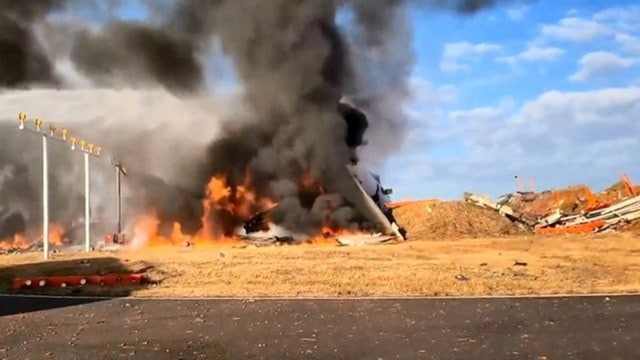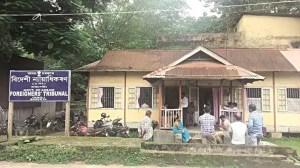Stay updated with the latest - Click here to follow us on Instagram
‘Jeju Air flight got info on bird strike from control tower before crash’: South Korean ministry on accident that killed at least 179
The Jeju Air plane was reportedly returning from Thailand and the accident took place while landing.
 Firefighters carry out extinguishing operations on an aircraft which drove off runaway at Muan International Airport in Muan, South Jeolla Province, South Korea. (Yonhap via REUTERS)
Firefighters carry out extinguishing operations on an aircraft which drove off runaway at Muan International Airport in Muan, South Jeolla Province, South Korea. (Yonhap via REUTERS)Hours after an aircraft carrying 181 people veered off a runway at an airport in South Korea killing all on board but 2 people, the country’s transport ministry said that the control tower had send warning of a bird strike to the plane before the crash.
Jeju Air flight 7C2216, arriving from the Thailand’s capital Bangkok at Muan International Airport, skidded off the runway just after landing and struck a fence with officials saying that its landing gear appeared to have malfunctioned. The incident happened when the aircraft was attempting to land shortly after 9 am local time.
The crash is being regarded as the worst air accident involving a South Korean airline in nearly three decades and is on track to become the country’s deadliest ever, according to ministry data.
The twin-engine Boeing 737-800 can be seen in video from local media skidding down the runway with no apparent landing gear before slamming into a wall in an explosion of flame and debris. Two crew members were rescued from the tail section of the burning plane, Muan fire chief Lee Jung-hyun told a briefing on Sunday.
Authorities have switched from rescue to recovery operations and because of the force of the impact, are searching nearby areas for bodies possibly thrown from the plane, Lee added, according to news agency Reuters.
BREAKING: Video shows crash of Jeju Air Flight 2216 in South Korea. 181 people on board pic.twitter.com/9rQUC0Yxt8
— BNO News (@BNONews) December 29, 2024
What are the family members of those on the plane saying?
Hours after the crash, family members gathered in the airport’s arrival area. Red Cross volunteers distributed blankets while papers were passed around for relatives to provide their contact details.
One relative stood at a microphone, desperately seeking more information from authorities. “My older brother died, and I don’t know what’s going on,” he said, according to Reuters.
Mortuary vehicles were lined up outside to transport the bodies, and authorities confirmed a temporary morgue had been set up. Meanwhile, the crash site was filled with the smell of aviation fuel and blood, as reported by Reuters witnesses. Workers in protective suits and masks combed the area, while soldiers searched through the surrounding bushes.
What has Jeju Air said about the crash?
Jeju Air CEO Kim E-bae apologised for the accident, bowing deeply during a televised briefing. He said that the cause of the crash was still unknown and that the aircraft had no record of accidents and there were no early signs of malfunction.
No abnormal conditions were reported when the aircraft left Bangkok’s Suvarnabhumi Airport, said Kerati Kijmanawat, president of Airports of Thailand.
Boeing said in an emailed statement, “We are in contact with Jeju Air regarding flight 2216 and stand ready to support them. We extend our deepest condolences to the families who lost loved ones, and our thoughts remain with the passengers and crew.”
What is a bird strike and how does it affect aviation?
Bird strikes generally happen when the aircraft pass through areas where birds are concentrated. Certain geographic locations, such as areas near wetlands, garbage dumps, and open fields, provide habitats that attract large flocks of birds. These locations are common near airports, making bird strikes a particular concern for aviation safety.
A bird strike occurs when a bird, or a group of birds, flies into the path of an aircraft. Birds often fly at altitudes that intersect with the flight path of airplanes, especially during takeoff or landing. Birds in flight are often unaware of the approaching aircraft until it’s too late. Additionally, birds are more likely to fly in flocks, which can create a higher chance of a collision with multiple birds at once.
- 01
- 02
- 03
- 04
- 05































